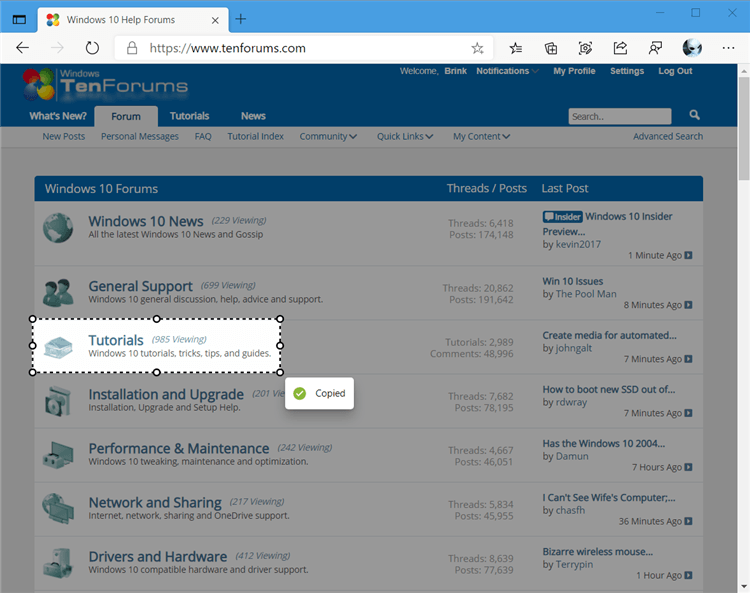[German]Google’s developers decided to disable the memory optimization (RAM allocation) feature for Windows 10 version 2004, which should be built into the M85 development branch of the Chromium browser. The reason: this optimization led to performance losses of between 10 percent and 13 percent more CPU power consumption.
微软目前正在推出Windows 10 KB4559309补丁,以在Windows 10版本2004的PC上安装新的Edge浏览器。 这似乎是逐步推送的第一阶段,Chromium 版 Edge浏览器正在向一小部分用户推出。随着Windows 10版本2004预览版Windows Update的推送,该浏览器将继续扩展到每个用户。. The Windows 10 '2020-08 Microsoft Edge Update for Windows 10 version 2004 ' update is targeting Windows 10 versions 1809, 1903, 1909, and 2004. Windows 10 KB4576754 Edge update. Starting this week, the new Edge will be heading to all Windows 10 users through Windows Update. In two separate blog posts, Microsoft confirmed that it will be included for the Windows 10 versions 1803, 1809, 1903, 1909, and up to the latest 2004 updates. Meaning, it will be available to almost 1 billion users of Windows 10.
The Google Chrome browser and all Chromium-based browsers are known by users for its RAM consumption. This should have been changed soon, at least for the Windows 10 May 2020 update (version 2004).
RAM optimization in Windows 10 2004

As part of the Reunion project, which brought together Win32 applications and UWP apps for developers, Microsoft has also introduced a new segment heap API. Applications can use this new API to optimize and reduce memory usage compared to the previous legacy heap.

InIn a blog post Improving Memory Usage in Microsoft Edge, Kim Denny, Microsoft Program Manager for Edge, revealed some details in mid-June 2020. In the case of the chromium-based Edge browser, the new API led to a reduction of up to 27% in the browser’s memory usage in laboratory tests. Since everything is based on the Chromium project, the memory reduction under Windows 10 version 2004 applies to all Chromium-based browsers like Google Chrome, Vivaldi etc., and not only to the Edge browser.
The price for optimization: losses up to 13 performance
However, an Intel engineer, who took a closer look at the whole thing, noticed that this memory optimization was bought at the price of a sometimes drastic loss of CPU performance. The discussion is in the Chromium Bug List in Thread Issue 1102281: Performance regression with Windows segment heap. There, the person concerned states that he has noticed the following performance losses in benchmarks for an Intel i9-9900K processor
- Speedometer2.0: ~ -5%
- WebXPRT3: ~-5.8%
- JetStream2: ~-6.2%
This is the result of using the new segment heap API under Windows 10 version 2004. ZDNet took it up in this article and reported performance losses between 10% (performance loss in the speedometer 2.0 benchmark) and 13% increased CPU power consumption, which Google determined in laboratory tests.
Chromium developers pull the rip cord
Techdows then noticed that the Chromium developers have announced to disable the RAM optimization feature using the Segment Heap API on Windows 10 version 2004 in the Chromium development branch M85.

Bruce Dawson from the Chromium development team goes into some details in this post. For example, he mentions that the chromium build in question contains some optimizations that make it difficult to interpret various test results – after the introduction of various measures. Dawson wrote:
Although I’ve heard encouraging things from lab tests about memory savings, I don’t see any way to keep this enabled until we have clean telemetry data and lab tests for 20H1, which will not happen in time for M85.
Edge Chromium Windows Update
So the plan is to turn this off for M85 (which will give us another telemetry data point) and rethink this in the future.
So the memory optimization is not off the records forever – but the impact is so huge that the chromium developers now had to pull the feature.
Microsoft wants to improve
A Microsoft Edge developer points out in the above-mentioned post that it is common practice to swap one resource for another. More often it is increased memory consumption, accompanied by reduced CPU usage, which is chosen as optimization criterion. In this case, the reduction of memory consumption simply results in increased CPU performance.

In the short term, Microsoft developers see the deactivation of the function in the M85 development branch as ‘a good compromise’ and are investigating whether the performance of the segment heap can be improved. However, according to Microsoft, reducing the “segment heap” API-related CPU performance increase would require “significant changes to the browser’s entire code base”. Chances are therefore good that the memory optimization feature will eventually return to the Chromium browsers.
Windows 10 2004 Edge Chromium Download
Advertising
